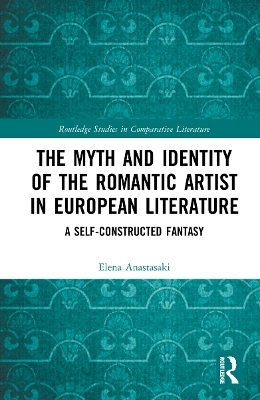
The Myth and Identity of the Romantic Artist in European Literature
Routledge (Verlag)
978-1-032-31414-3 (ISBN)
This study addresses the question of artistic identity and the myth of the artist as it has been shaped by the artists themselves. While the term artist is to be understood in a broad sense, the focus of this study is the literature of the Romantic tradition. Identity is largely perceived as a construct, and a central hypothesis of this book concerns its aesthetic value and the ways it creates dominant narratives of self-perception that produce powerful myths.
The construction of the artist’s identity, be it collective or personal, rests on a series of aesthetic praxes. Caught between the mythic idealisation of poetic genius and its social devaluation, the Romantic artist seeks to create a place for himself, and in doing so, he engages in his own mythmaking. This process is studied in an interdisciplinary perspective, approaching texts and writers from different traditions. The study analyses various typologies of the artist, numerous mythmaking strategies as well as several postural techniques; all of which have sketched major direct or indirect fictional self-portraits in the European tradition.
Elena Anastasaki is Assistant Professor of Comparative Literature at the Department of Language and Intercultural Studies at the University of Thessaly (Greece). She holds a PhD in Comparative Literature from the Universities of Kent and Paris 8.
Acknowledgments
Notes on Translation
Introduction
Overview of the Background Scene
Outline of Approach, Key Concepts and Methodology
Book Structure
Part One
Chapter 1, Forming Identity: An Interdisciplinary Approach
Ethos and the Image of the Author
Narrative and Identity Theories: Narrating the Self, an Ontological Dilemma
Identity and Aesthetics
Kant, Schiller, and Romantic Aesthetics
Chapter 2, The Making of Artistic Genius
A philosophical Concept
The Figure of Chatterton
Coleridge’s Chatterton: A Life-long Companion
Alfred de Vigny’s Chatterton: The Emblem of a Social Cause
Chapter 3, Goethe’s Prometheus, Rousseau’s Pygmalion, and their Progeny
"Here sit I, forming mortals / After my image": The Promethean Artist
Johann Wolfgang von Goethe, "Prometheus"
Lord Byron, "Ode to Prometheus"
Percy Bysshe Shelley, Prometheus Unbound
Victor Hugo, "Genius," "The grieving poem weeps"
Théophile Gautier, "On the Prometheus of Madrid"
Pygmalion and the Ontological Status of the Work of Art
Jean-Jacques Rousseau, Pygmalion
Thomas Lovell Beddoes, "Pygmalion, or the Cyprian Statuary"
Part Two
Chapter 4, "Now, if I know myself, I should say, that I have no character at all"–Byron’s Mythmaking Strategies
The Quest for a Personal Voice
The Poet’s Physical Appearance
The Poet as Pilgrim: Childe Harold’s Pilgrimage
Poetic Ventriloquism: The Lament of Tasso and The Prophecy of Dante
Byron’s Public Persona
Chapter 5, Percy Shelley and the Metaphysical Authenticity of the Poet
Alastor, or The Adventures of the Poetic Mind
From Aesthetic Experience to the Aesthetic Self
Adonais, or the Self from Without – Pivotal Moments of Self Awareness
From Poet to Poet: "To Wordsworth" and "Lines to __" ("Sonnet to Byron")
Chapter 6, Honoré de Balzac, the Napoleon of Letters
"[L]a tête dans le ciel et les pieds sur cette terre" – Balzac’s Fictional Artists
The Portrait of the Artist as an Old Man
The Artist as Martyr
Sympathetic Parody: Grotesque and Sublime Identities
The Bourgeois Artist
Chapter 7, Théophile Gautier, Stylistic Identity and Poetic Time
The Negation of the Self: Les Jeunes-France
The Golden Fleece: A Quest for Rubens’ Blonds, or How Art Spoils Reality
Autobiographic Sketches and the Poet as Shapeshifter
Conclusion, A Sociopoetical Approach to Genius
Materialistic Representations of Genius
The Poet’s Two Bodies
Napoleon
Artistic Identity as a Narrative Construct in a European Context
Works Cited and Consulted
| Erscheinungsdatum | 17.08.2022 |
|---|---|
| Reihe/Serie | Routledge Studies in Comparative Literature |
| Verlagsort | London |
| Sprache | englisch |
| Maße | 152 x 229 mm |
| Gewicht | 453 g |
| Themenwelt | Kunst / Musik / Theater ► Kunstgeschichte / Kunststile |
| Geisteswissenschaften ► Sprach- / Literaturwissenschaft ► Anglistik / Amerikanistik | |
| Geisteswissenschaften ► Sprach- / Literaturwissenschaft ► Literaturgeschichte | |
| Geisteswissenschaften ► Sprach- / Literaturwissenschaft ► Literaturwissenschaft | |
| ISBN-10 | 1-032-31414-1 / 1032314141 |
| ISBN-13 | 978-1-032-31414-3 / 9781032314143 |
| Zustand | Neuware |
| Informationen gemäß Produktsicherheitsverordnung (GPSR) | |
| Haben Sie eine Frage zum Produkt? |
aus dem Bereich


